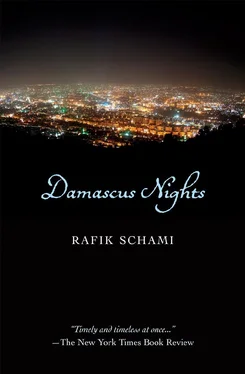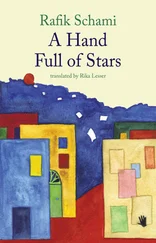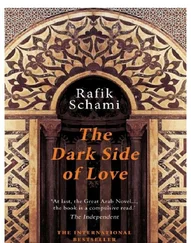The last sounds he registered in the early morning hours before he turned on his side and fell asleep were the loud chirping from under the pomegranate tree and some tender whispers from Afifa's bedroom.
Tuma the emigrant was the first to appear early that afternoon. He paced up and down Salim's room, asking where the others were keeping themselves so long. Then he sat down a while, stood up impatiently, and again started pacing quickly back and forth. It was eight o'clock before everyone arrived.
"It's been forever," the emigrant began, "since old Salim took his last trip. And that's exactly what's keeping him from speaking — the longing in his soul for foreign places." Tuma stopped, took a deep pull on the waterpipe, and passed it along.
"Okay" — Tuma's speech was infected with American idioms from his days in the United States—"we all know he's a born coachman! And what coachman ever rests once he's reached his destination, even if he's managed to find the most beautiful oasis in the world? Well? No coachman worth his whip. And that's what's made our friend sick."
At these words Salim nodded thoughtfully.
"He has to travel over seven mountains, through seven valleys, and across seven plains. He has to sleep under seven foreign skies in seven foreign cities, and you'll see, then his words will come back."
This idea so enthused the former minister that he offered to cover all expenses. And Mehdi and Tuma offered to serve as travel guides.
The friends scoured Damascus for days until they secured an old coach. Their hopes rose when they saw Salim, with gleaming eyes and fresh attire, climb aboard and give his whip a masterful crack. Only bad coachmen actually hit their horses — the good ones only hint at what the horses will be spared if they obey. The horses trotted off, and a few neighbors cried as they waved goodbye.
Salim drove with his entourage through seven cities and over seven mountains. He crossed seven plains and valleys. The trip lasted forty days. He came back exhausted and excited, but still unable to speak. Tuma had to listen to the others complain about how much valuable time had been lost due to his suggestion.
Next came the nature healers — all kinds — and even Um Khalil, an experienced midwife. They administered to the coachman the most repugnant potions, ointments, and herbal concoctions imaginable, and Salim grew paler from day to day, but he was still unable to speak. Roman Catholic holy water was as ineffective as its Greek Orthodox competitor, and holy sand from Mecca did as little to free his tongue as dust from Bethlehem.
"There are only eight days left," said the former minister, full of worry, and his words terrified the entire group on that late night. They sat mutely in their circle, as if their fairies, too, had tied their tongues. The clock struck twelve, but despite the late hour the friends were not the least bit tired. "I've got it," the teacher cried out and slapped himself hard on the knee. "I know it for sure. It's as plain as day," he spoke loudly, as if he were trying to buck himself up after all the defeats. "It's seven stories — old Salim has to hear seven stories in order to regain his voice."
Musa the barber was immediately enthusiastic, but not the taciturn Ali. Tuma and Isam failed to find much merit in the proposal, whereas Junis was quickly convinced. Only the minister refrained from giving his opinion right away.
'Talk, talk, talk. That's all teachers and barbers know how to do! That's how you make your living," Isam waxed indignant.
"I don't have the faintest idea how to tell a story, and I don't think this rubbish is going to cure Salim," declared Ali.
The friends quarreled a long time, and it was almost dawn before the minister, full of concern for the old coachman's voice, was able to intervene. With well-chosen words he quieted the emigrant and Isam. Even Ali, himself at a loss for any other solution, agreed. "Go ahead," he said. "If that's what poor Salim wants, I won't stand in the way." And that was what Salim wanted.
"Who should start?" asked the barber, and the newly reconciled friends were once again quarreling. No one wanted to go first.
"Fine!" Isam shouted. "In prison, whenever we faced an unpleasant task, we would let the cards decide." He looked at Salim. "Do you have any playing cards?" Salim nodded, then stood up and fetched his old, crumpled deck of cards.
"Now watch!" Isam spoke quietly. "I am holding six cards. I put in one ace and shuffle them up. Whoever draws the ace tells the first story. Agreed?"
They all nodded their heads in silence. Only the barber spoke, to urge Isam to shuffle the cards well.
Isam lay the cards down on the small table. Because he was the oldest, the emigrant was allowed to draw first. He drew a jack, the caf'e owner a deuce, and the barber a king. The teacher then pulled his card and flipped it over. It was the ace of spades. The former inmate, the minister, and the locksmith all sighed with relief.
Salim, however, was doubled over in silent laughter,
so that the barber once again began
to doubt whether the old coach-
man was really mute or simply
pulling their
leg.
5 Why one man allowed his voice to be chained, and how he later set it free
Mehdi, a tall, haggard man, had taught geography for thirty-five years. He couldn't put an exact number on how many pupils he had acquainted with the countries of the world, their rivers and mountains, but he was proud of counting among his former students two bank directors, one general, and several doctors. In the old quarter he commanded a certain respect — which he basked in somewhat proudly — with the result that many people respectfully avoided him. It was difficult to converse with him at any length, at least as an equal partner. Moreover, even if the talk started with the weather, the latest price hikes, or a cholera epidemic, sooner or later it always came back to geography — and the ignorance of his interlocutor. "If you don't know how high the Himalayas are, how can you appreciate how low things really are here in Damascus?" he is supposed to have said to a neighbor with deliberate ambiguity. The gossipmongers on his street dubbed him "Mister Himalaya" from that day on. The only time Mehdi left geography out of the conversation was when he met with Salim and his circle of friends.
That November afternoon dark clouds had once again gathered above Damascus. It had just rained for half an hour and the streets and people smelled of fresh earth. The air was cold as ice. Mehdi adjusted his scarf as he stepped outside. He greeted the Armenian cobbler sitting at his large sewing machine. The man peered over the rim of his lowered glasses and held up two fingers, to inform Mehdi that the new shoes the teacher was having made would be ready in two days.
"That's fine," Mehdi whispered and went his way. "When was the last time the cobbler actually smiled," he asked himself, but didn't know the answer.
A column of military vehicles rolled across the square in front of the Bab Tuma, or Thomas's Gate, and veered off to the east. The children were delighted by the spraying and splashing from the abundant puddles. "Charge! Off to the war!" they shouted with glee to the soldiers sitting crammed inside the trucks, who simply stared directly ahead, full of worry, completely oblivious to the general jubilation.
That spring, an uprising had broken out just across the border, in the Iraqi city of Mosul, and had ended in great bloodshed. The Iraqi regime accused Nasser of having financed and incited the rebels.
Something between the two countries had gone wrong. The Iraqi president Kassem, whom Radio Damascus had proclaimed the hero of the Iraqi revolution only a year before, suddenly fell into disgrace, without the slightest explanation. From then on, the Syrian radio characterized him as the bloodthirsty "Butcher of Baghdad." Reports of starvation, rebellion, and cholera in Iraq were now filling the airwaves almost daily, but no mention was made of any unrest or open conflict in Syria itself. Rumor had it that a group of young Syrian officers had mutinied against the government. They were said to have captured important positions in the east with the help of Iraqi troops. Radio Damascus issued assurances that the situation in the east was calm, but Mehdi refused to believe the speaker's reassuring words. Governments in Syria, without exception, made a habit of proclaiming peace and order just when they were on the verge of collapse. A bitter feeling arose in Mehdi. What kind of times are these? The regime declares the dictator in a neighboring country a brother and a hero, then condemns him as an enemy and cowardly traitor, without asking the people of either nation for their opinion, although it was their sons who would be fighting each other if it came to war.
Читать дальше












